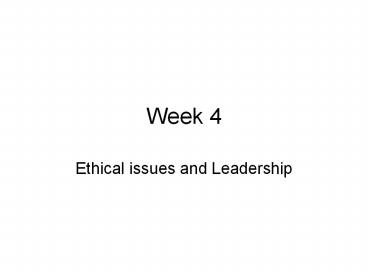Week 4 PowerPoint PPT Presentation
1 / 29
Title: Week 4
1
Week 4
- Ethical issues and Leadership
2
Ethics is about the way we treat others.
- Many issues about the way we treat others.
- Is this Ethical or not, if so why or why not.
3
Digression into Leadership
- Trust and Leadership.
- Think of leaders you have trusted.
- What qualities did they have?
- Think of leaders you distrusted.
- What made you distrust them.
- Note some people have suggested trust is easy to
lose and hard to build. Distrust operates
differently than trust.
4
Why Is Trust in Leadership Important?
- What happens when subordinates trust leaders?
- What happens when subordinates distrust leaders?
5
Can a supervisor be effective without having
subordinate trust?
- This is not an easy question.
6
So How are Ethics, Trust, and Leadership Related?
- How do good leaders build trust?
- How do poor leaders lose trust?
7
Ethical Issues in Leadership
- Information, communication, and expectations
(discuss later). - Confidentiality of information.
- What do you share with others?
- Co-workers. Can you discuss performance issues
of others behind their backs. Access to records. - References?
8
Ethics and Justice
- Book does not raise this issue directly. Ethics
relates to treating employees fairly rather than
treating them arbitrarily. - Managers who treat employees unfairly could
readily be PERCEIVED to be unethical by others. - Office Space was Lumberg ethical or not to Milton.
9
Ethics and Justice
- Distributive Justice
- Are the rewards/punishments given out similarly
for similar consequences? Lets go through some
cases. - Would similar people be treated similarly.
- P. 147 case.
- When is it ok to treat people dissimilarly.
- Much harder question.
- Example, when would it be OK to treat Milton like
he got treated.
10
Procedural Justice
- Follow certain guidelines consistently for
everyone. - Examplesin recruiting is everyone treated
similarlyasked similar types of questions. - Performance appraisalare sources used the same
for everyone.
11
Procedural Justice Includes
- Grievance system
- If have problems, perhaps due to bias, someone
has a chance to correct the problem.
12
Justice perspective will be revisited throughout
the course.
- Procedural (process)
- Distributive (outcome).
- Usually employees. But procedural can apply to
consumer, shareholder, business alliance,
community etc as stakeholders.
13
Conflicts of interest
- Conflict of interest occurs when your self
interests compromise your ability to make
objective decisions. - Appearance of a conflict of interest vs actual.
- CEO and corporate foundation
- Enron and conflicts of interest.
- Includes bribes/kickback
- Influence peddling
- Privileged information (insider trading).
- Can a CEO have too many stock options?
14
Conflicts of interest abound
- Can you supervise your friends? Is it a conflict
of interest? - Think about supervisor dating subordinate.
- When does it lead to an appearance of conflict of
interest? - Other examples of conflicts of interest.
- What types of problems occur with conflicts of
interest?
15
How does one deal with Conflicts of interest
- First, minimize exposure.
- Blow the whistle on people who try kickbacks.
- When transparent conflict, have someone else make
decision. - Accounting and approval of expenditures for self.
16
Al Dunlap and Ethics Case
17
Ethics and work force diversity.
- How do you manage people who are different.
- Communication skills play an important role.
- Does this create problems with Distributive
justice? - A positive approach to diversity.
18
Characteristics of people who show respect
19
Big question
- Inappropriate performance. Can one give
corrective comments and still show respect? - How?
20
Relationships with subordinates
- Hiring
- Performance appraisal
- Terminations.
- Discipline
- Harassment
- Family and personal issues.
- Employment Law.
- Giving people assignments.
21
Cases and Managing this well.
22
Managers as a Role model/shaper of behavior.
- Managers are responsible for the behavior of
their employees. If employees are harassing
other employees and manager does nothing then
what does this communicate to those doing the
harassing? Back Stabbing.
23
Managers need to set standards
- Make them clear and unequivocal. Performance
appraisal. - Many employees try to figure out what supervisor
wants. - Be careful about what you say.
- Continually communicate standards. Publicly and
privately. - Staff meetings. Monitor progress on standards.
Report that progress. (Al Dunlap did this OK).
24
Here is an important element
- To what extent should managers be flexible.
- Situations are complex. Similar situations deal
require different actions. - Two employees come to work drunk against company
policy. One is outstanding worker and one is
below average. What do you do?
25
Another situation
- Trying to change processes and move from
decentralized to centralized system of purchasing
to save inventory costs and shipping time (just
in time inventory). - A long time supplier has cut deals in the past
but can not manage the just in time processes.
You have an alternate supplier who you believe
can do both. What do you do?
26
Managers as a role model.
- What you do, others are likely to imitate.
- If you act with respect to all, then others are
likely to do. If disrespect, then disrespect. - Open communication.
27
Book says
- Communication is key to ethics and management.
- Book says honesty is rule 1.
- Is it that simple?
28
Think about customer Relationships
- What are relationships like when there is
distrust? - What are relationships like when there is trust?
29
In summary
- Examples of good managersethical managers.
- Can a good manager be unethical?
- Does ones career suffer for being too ethical?
Do the unethical people rise to the top?

